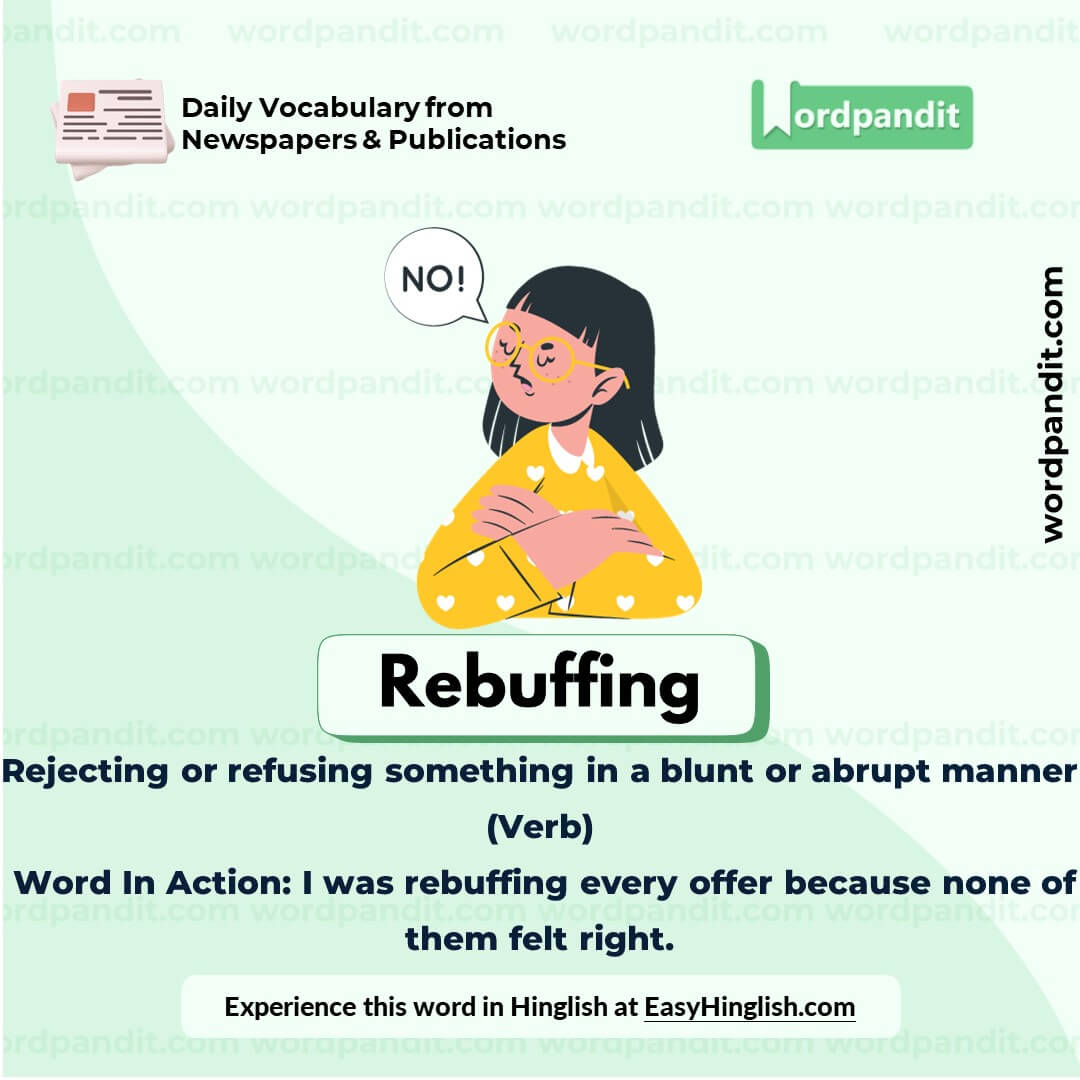Daily Vocabulary from International Newspapers and Publications
Expand Your Vocabulary with Wordpandit’s Global Vocabulary Hub
At Wordpandit, we are committed to helping you develop a truly global vocabulary by drawing from some of the most respected international publications. This section is designed to keep you ahead of the curve by introducing you to words that define global conversations and trends.
The Power of Global Sources
To help you think and communicate on a global scale, we curate vocabulary from renowned international sources, such as:
- The New York Times
- The Washington Post
- BBC
- The Guardian
- The Economist
- Scientific American
- Psychology Today
- And many more...
Stay Global, Stay Competitive
Our daily updates from international publications ensure you are consistently exposed to new words that reflect global news and developments, making sure your vocabulary is not only current but also globally relevant.
Enhance Your Global Perspective
Whether you’re preparing for international exams, aiming to excel in global business communication, or want to enhance your language skills for personal growth, Wordpandit offers the resources you need to thrive in a global context.
Effective Learning, Global Reach
Our learning methodology combines global examples, memory aids, and interactive activities, allowing you to internalize new words effectively and apply them in real-world scenarios.
Begin Your Global Vocabulary Journey Now!
Why Choose Wordpandit?
Practical Learning: Focus on words you'll actually encounter in real-world reading, enhancing your comprehension and communication skills.
Diverse Content: From current affairs to scientific breakthroughs, our varied sources expose you to vocabulary across multiple domains.
Effortless Integration: Make Wordpandit a part of your daily routine. Just a few minutes each day can significantly boost your lexicon over time.
Your Path to Vocabulary Mastery
- Visit our Daily Vocabulary section regularly
- Explore new words and their usage in context
- Practice incorporating these words into your own writing and speech
- Track your progress as your vocabulary expands
Start Your Journey Today
Embark on your vocabulary enhancement journey with Wordpandit. By consistently engaging with our daily posts, you'll build a robust vocabulary that serves you well in academic, professional, and personal contexts.
Remember, a word a day keeps linguistic limitations at bay. Make Wordpandit your daily companion in the quest for vocabulary excellence!
WORD-1: Rebuffing
Context:
"These communities’ rebuffing of written text was also strategic, as written histories risked exposing themselves to state authorities;" - Aeon
Explanatory Paragraph:
The word "rebuffing" refers to rejecting something in a blunt or ungracious manner. In this context, it describes the communities' deliberate decision to reject or avoid written records, seeing them as potentially dangerous in exposing them to government scrutiny.
Meaning: Rejecting or refusing something in a blunt or abrupt manner (Verb)
Pronunciation: ri-BUH-fing
Difficulty Level: ⭐⭐⭐ Intermediate
Etymology: Derived from the Old French "rebuffer," meaning to reject or refuse, which in turn comes from the Latin "re-" (back) and "buffare" (to puff or blow).
Synonyms & Antonyms:
Synonyms: Rejecting, repelling, spurning, snubbing
Antonyms: Accepting, welcoming, embracing, approving
Usage Examples:
- She shocked her colleagues by rebuffing their suggestions for the new project.
- The ambassador's rebuffing of the peace proposal sparked international debate.
- His rebuffing of her invitation was perceived as rude.
- The manager is known for rebuffing ideas that don't align with the company’s vision.
Cultural Reference:
"Rebuffing" can often be seen in historical movements where communities or leaders reject outside influences or impositions to preserve autonomy or tradition. For instance, during the Renaissance, some thinkers rebuffed established dogmas to pave the way for new knowledge and freedom of thought. - Historical Analysis
Think About It:
Why might someone choose to rebuff an idea or offer, even if it seems beneficial on the surface?
Quick Activity:
Think of a time when you or someone you know rebuffed an idea or proposal. Write a brief paragraph describing the situation and the reasoning behind the decision.
Memory Tip:
Picture someone "puffing" their cheeks in annoyance as they refuse something—a visual reminder of the Latin root "buffare" (to puff) in "rebuffing."
Real-World Application:
"Rebuffing" is often used in professional settings to describe the rejection of proposals, ideas, or deals. It is a versatile term applicable in diplomatic, social, and personal interactions where a strong rejection is conveyed.
WORD-2: Toiled
Context:
"Scott suggests we withhold our pity: while those living within the reaches of the state toiled under systems of taxation, conscription and servitude to state interests, the seemingly ‘uncivilised’ populations of the rural hills achieved a ‘purposeful statelessness’ that kept them free from all of the above." - Aeon
Explanatory Paragraph:
The word "toiled" refers to working extremely hard, often with difficulty and under oppressive conditions. In this context, it describes how people under state control endured laborious tasks and burdens, such as taxation and servitude, imposed by the state's systems.
Meaning: Worked hard or labored intensely, especially under difficult conditions (Verb)
Pronunciation: toy-ld
Difficulty Level: ⭐⭐⭐ Intermediate
Etymology: From the Old French "toiler," meaning to struggle or make great effort, and from Latin "tudiculare," which referred to crushing or grinding.
Synonyms & Antonyms:
Synonyms: Labored, slogged, struggled, worked hard
Antonyms: Rested, relaxed, idled, loafed
Usage Examples:
- The farmers toiled from dawn until dusk to harvest their crops before the storm arrived.
- She toiled for years to build her business, overcoming countless obstacles.
- The workers toiled in the factory under harsh conditions, dreaming of a better future.
- He toiled over his research paper, determined to get every detail right.
Cultural Reference:
The concept of "toiling" has been depicted in literature such as in John Steinbeck's *The Grapes of Wrath*, where migrant workers toil relentlessly in pursuit of the American Dream, often facing exploitation and hardship.
Think About It:
Why do some people choose to toil under difficult circumstances while others avoid such situations, even if it means fewer rewards?
Quick Activity:
Write a short paragraph describing a scenario where you or someone you know toiled to achieve a goal. Reflect on the challenges and the rewards of the effort.
Memory Tip:
Imagine "toiling" as turning the soil in a field under the hot sun—hard work that leaves you exhausted but yields results. Connect the image of effort and reward to the meaning of the word.
Real-World Application:
"Toiled" is often used in motivational contexts, describing the hard work and perseverance required to achieve significant goals, whether in personal endeavors, professional projects, or societal progress.
WORD-3: Expansive
Context:
"This was the era of expansive state-building in Iraq and Afghanistan; soldiers and technocrats swooped in from abroad to install a new government designed by foreign officials, and sought to ram in the projects amid violent insurgencies jeopardising their plans." - Aeon
Explanatory Paragraph:
The word "expansive" refers to something wide-ranging, extensive, or involving a lot of space, ideas, or scope. It can also describe a person who is open and communicative. In the context provided, "expansive" describes the large-scale and ambitious nature of state-building efforts.
Meaning: Covering a wide area or involving many elements; extensive (Adjective)
Pronunciation: ex-PAN-siv
Difficulty Level: ⭐⭐⭐ Intermediate
Etymology: From Latin "expansus," meaning "spread out," and "expandere," meaning "to spread out or stretch."
Synonyms & Antonyms:
Synonyms: Broad, extensive, wide-ranging, comprehensive
Antonyms: Limited, narrow, restricted, confined
Usage Examples:
- The company adopted an expansive strategy to dominate the global market.
- Her expansive smile revealed her genuine excitement about the project.
- The museum features an expansive collection of modern art.
- He spoke in an expansive tone, sharing his ideas freely with the group.
Cultural Reference:
"The concept of an expansive universe, as discussed in cosmology, suggests that space itself is continuously stretching, causing galaxies to move farther apart." - Popular Science
Think About It:
How does the concept of being expansive apply to personal growth and open-mindedness?
Quick Activity:
Write a short paragraph using "expansive" to describe an ambitious project or a broad vision.
Memory Tip:
Think of "expansive" as something that "expands" broadly—like a map spreading out over a large table.
Real-World Application:
The word "expansive" is often used in discussions about strategic planning, architecture, and personal traits, such as when describing a visionary leader's wide-ranging ideas or a sprawling development plan.
WORD-4: Derogatory
Context:
"These often include critical and derogatory remarks, such as ‘You’re useless – no one likes you.’ The voices and their comments may be linked to difficult times from a person’s past." - Psyche
Explanatory Paragraph:
The word "derogatory" describes comments or actions that are disrespectful or demeaning. In this context, it highlights remarks aimed at diminishing a person's sense of worth, often tied to painful or traumatic experiences.
Meaning: Showing a critical or disrespectful attitude (Adjective)
Pronunciation: dih-ROG-uh-tor-ee
Difficulty Level: ⭐⭐⭐ Intermediate
Etymology: From the Late Latin "derogatorius," meaning detracting or diminishing, which derives from "derogare" (to take away or detract).
Synonyms & Antonyms:
Synonyms: Insulting, disrespectful, demeaning, belittling
Antonyms: Complimentary, respectful, flattering, laudatory
Usage Examples:
- The teacher warned the students against using derogatory language in class.
- His derogatory comments about her work hurt her deeply and caused a rift between them.
- The article received backlash for its derogatory portrayal of a cultural group.
- She chose to ignore the derogatory remarks and focus on her achievements.
Cultural Reference:
Derogatory language has historically been used as a tool of oppression, as seen in racial slurs or stereotypes that aim to demean and marginalize entire communities. Efforts like the Civil Rights Movement emphasized combating derogatory rhetoric to promote equality.
Think About It:
How does the use of derogatory language in media or daily conversations shape societal attitudes and individual self-esteem?
Quick Activity:
Reflect on a time you heard a derogatory remark. Write about how it made you feel and how such language could have been avoided or replaced with positive communication.
Memory Tip:
Think of "derogatory" as "dragging someone down" in their esteem or respect—an easy way to connect the meaning with its use.
Real-World Application:
The word "derogatory" is frequently used in discussions about workplace behavior, social media interactions, and legal cases involving defamation or discrimination. Understanding its implications can help foster respectful communication.
WORD-5: Perceive
Context:
"If this is something that happens to you, you might perceive a voice talking to you, or about you, even though nobody seems to be present." - Psyche
Explanatory Paragraph:
The word "perceive" refers to the ability to notice, recognize, or understand something, often through the senses or mental awareness. In the provided context, it highlights how a person might notice or become aware of a voice even when no physical source is present, illustrating the power of perception.
Meaning: To become aware of or understand something through the senses or the mind (Verb)
Pronunciation: per-SEEV
Difficulty Level: ⭐⭐⭐ Intermediate
Etymology: From Latin "percipere," meaning "to seize, understand," derived from "per-" (through) and "capere" (to take).
Synonyms & Antonyms:
Synonyms: Discern, recognize, sense, detect
Antonyms: Ignore, overlook, miss, disregard
Usage Examples:
- She could perceive the subtle change in his tone, signaling his discomfort.
- Many animals can perceive sounds at frequencies that are inaudible to humans.
- He perceived the opportunity as a chance to showcase his skills.
- The artist's work is perceived differently depending on the viewer's perspective.
Cultural Reference:
"In Plato's Allegory of the Cave, the concept of perception is central, illustrating how humans might perceive shadows on the wall as reality without realizing the existence of the true forms behind them." - Philosophy Classics
Think About It:
How does perception shape your understanding of reality, and how might it differ from others' perceptions?
Quick Activity:
Write down three scenarios where your perception of a situation might differ from someone else's, and explain why.
Memory Tip:
Think of "perceive" as "see through" — noticing or understanding something beyond the surface.
Real-World Application:
"Perceive" is commonly used in psychology, communication, and art to discuss awareness, interpretation, and understanding, emphasizing the importance of perspective in human interactions and creativity.
















